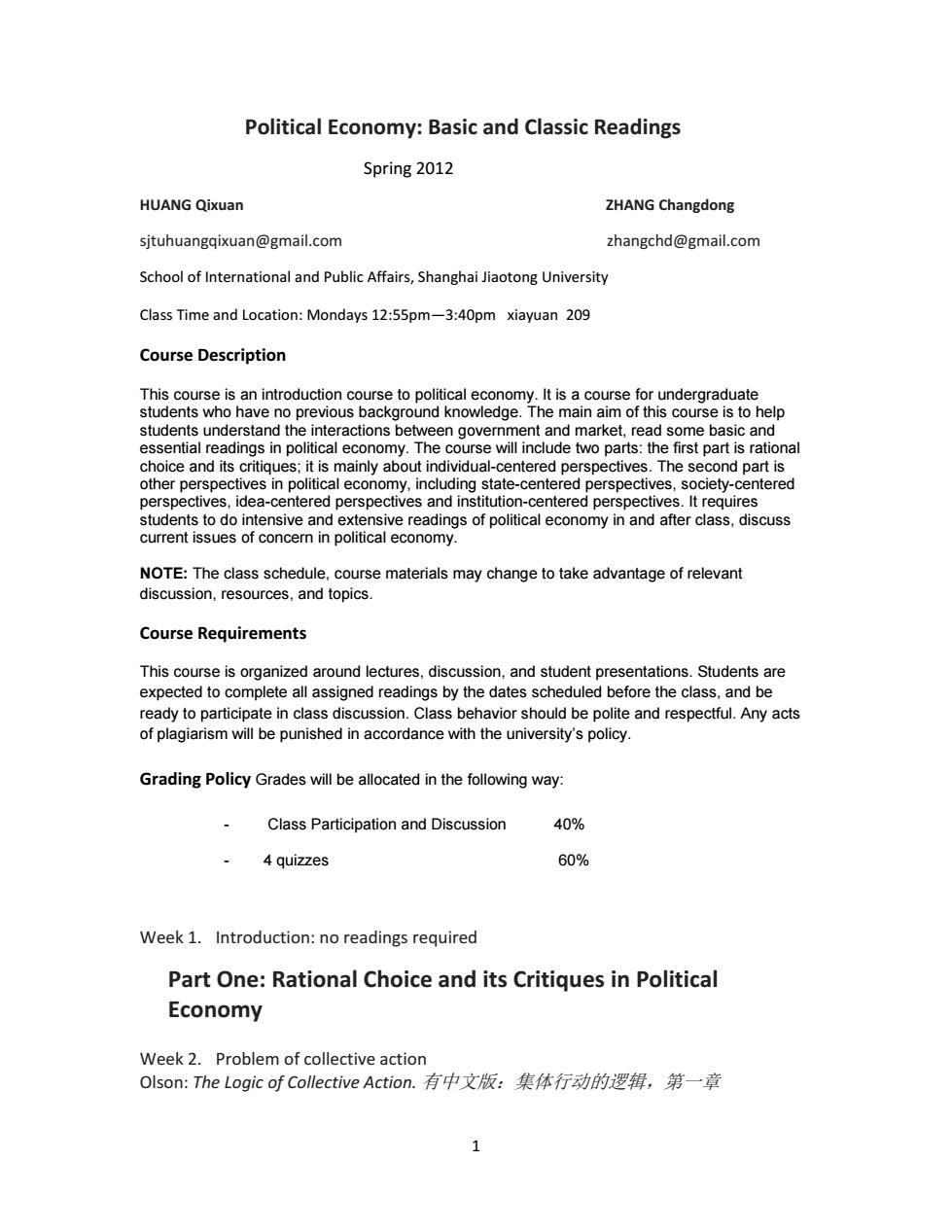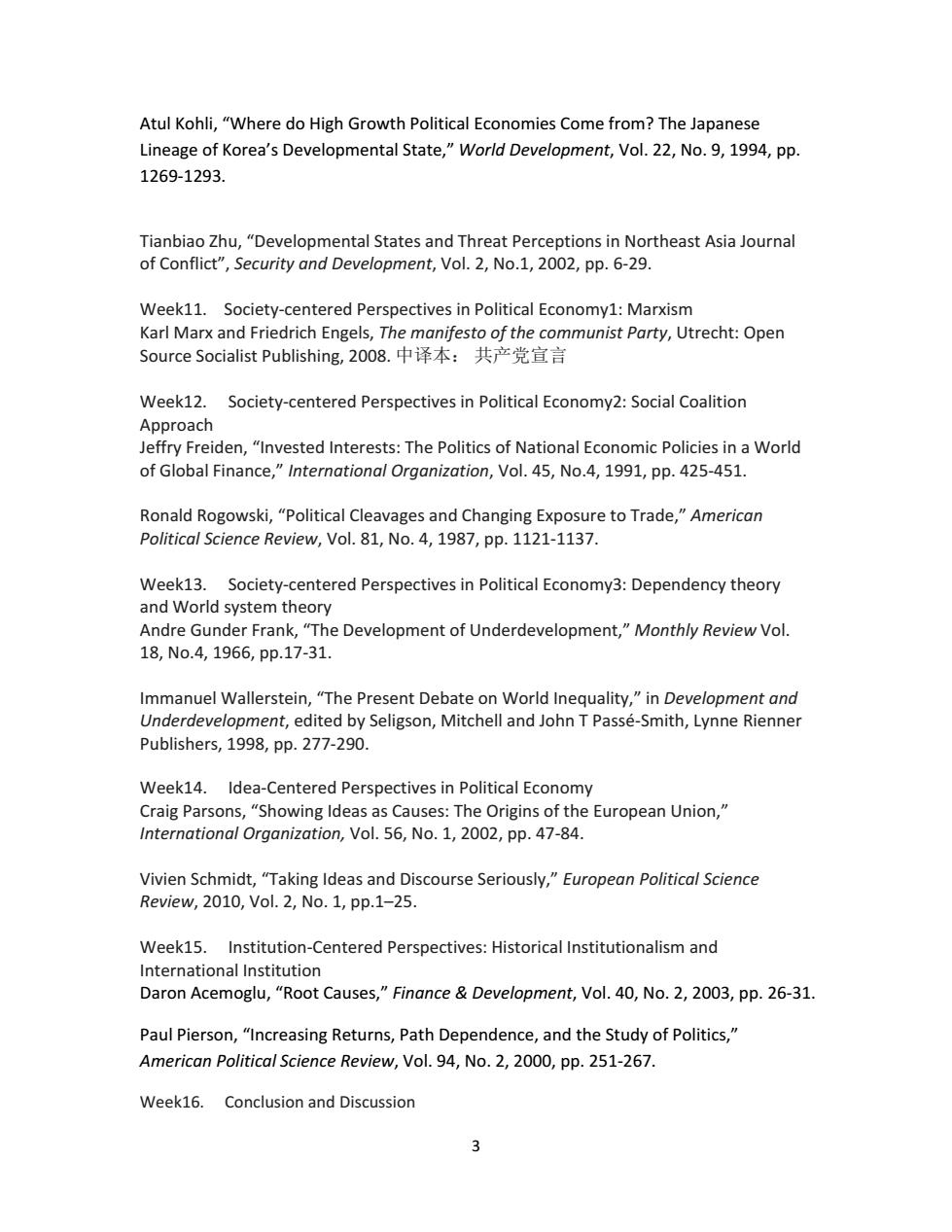
Political Economy:Basic and Classic Readings Spring 2012 HUANG Qixuan ZHANG Changdong sjtuhuangqixuan@gmail.com zhangchd@gmail.com School of International and Public Affairs,Shanghai Jiaotong University Class Time and Location:Mondays 12:55pm-3:40pm xiayuan 209 Course Description This course is an introduction course to political economy.It is a course for undergraduate students who have no previous background knowledge.The main aim of this course is to help students understand the interactions between government and market,read some basic and essential readings in political economy.The course will include two parts:the first part is rational choice and its critiques;it is mainly about individual-centered perspectives.The second part is other perspectives in political economy,including state-centered perspectives,society-centered perspectives,idea-centered perspectives and institution-centered perspectives.It requires students to do intensive and extensive readings of political economy in and after class,discuss current issues of concern in political economy. NOTE:The class schedule,course materials may change to take advantage of relevant discussion,resources,and topics. Course Requirements This course is organized around lectures,discussion,and student presentations.Students are expected to complete all assigned readings by the dates scheduled before the class,and be ready to participate in class discussion.Class behavior should be polite and respectful.Any acts of plagiarism will be punished in accordance with the university's policy. Grading Policy Grades will be allocated in the following way: Class Participation and Discussion 40% 4 quizzes 60% Week 1.Introduction:no readings required Part One:Rational Choice and its Critiques in Political Economy Week 2.Problem of collective action Olson:The Logic of Collective Action..有中文版:集体行动的逻辑,第一章
1 Political Economy: Basic and Classic Readings Spring 2012 HUANG Qixuan ZHANG Changdong sjtuhuangqixuan@gmail.com zhangchd@gmail.com School of International and Public Affairs, Shanghai Jiaotong University Class Time and Location: Mondays 12:55pm—3:40pm xiayuan 209 Course Description This course is an introduction course to political economy. It is a course for undergraduate students who have no previous background knowledge. The main aim of this course is to help students understand the interactions between government and market, read some basic and essential readings in political economy. The course will include two parts: the first part is rational choice and its critiques; it is mainly about individual-centered perspectives. The second part is other perspectives in political economy, including state-centered perspectives, society-centered perspectives, idea-centered perspectives and institution-centered perspectives. It requires students to do intensive and extensive readings of political economy in and after class, discuss current issues of concern in political economy. NOTE: The class schedule, course materials may change to take advantage of relevant discussion, resources, and topics. Course Requirements This course is organized around lectures, discussion, and student presentations. Students are expected to complete all assigned readings by the dates scheduled before the class, and be ready to participate in class discussion. Class behavior should be polite and respectful. Any acts of plagiarism will be punished in accordance with the university’s policy. Grading Policy Grades will be allocated in the following way: - Class Participation and Discussion 40% - 4 quizzes 60% Week 1. Introduction: no readings required Part One: Rational Choice and its Critiques in Political Economy Week 2. Problem of collective action Olson: The Logic of Collective Action. 有中文版:集体行动的逻辑,第一章

Week 3.Problem of credible commitment North,Douglass C.,and Barry R.Weingast.1989."Constitutions and Commitment:The Evolution of Institutions Governing Public Choice in Seventeenth Century England".Journal of Economic History 49(4):803-832. Week 4.Cooperation Grief:Coordination,commitment and enforcement:the case of merchant gild.Journal of Political Economy,1994. Week 5.Solving collective action problem 1:community,networks and norms Ostrom:Governing the commons.(Cambridge UP,1990)中译本:公共事务治理之道3 45章 Or Michael Taylor,"Rationality and Revolution",in Taylor ed.Rationality and Revolution.(Cambridge UP,1988) Week 6.Solving collective action problem 2:institutions Weingast,Rational Choice Institutionalism,in Katznslson and Milner,ed.Political Science:state of the discipline.APSA,2002.pp 660-93. Week 7.Bounded rationality Jones,Bryan D."Bounded Rationality."Annual Review of Political Science,Volume 2 (1999),Page297-321. Week 8.Critiques of rational choice theory D Green and I Shapiro,Pathologies of Rational Choice Theory(Yale UP,1994)中译本: 理性选择的病变(广西师大出版社)第二章第三章 or Wildavsky,Aaron."Choosing Preferences by Constructing Institutions."American Political Science Review 81(1987):3-21. Part Two:Other Perspectives in Political Economy Week9.State-centered Perspectives in Political Economy1:Realism Kenneth Waltz,"Globalization and American Power,"The National Interest,No.59,2000, pp.46-56. Robert Gilpin,War and Change in World Politics,New York:Cambridge University Press, 1981,pp.1-49. Week10.State-centered Perspectives in Political Economy2:Statist 2
2 Week 3. Problem of credible commitment North, Douglass C., and Barry R. Weingast. 1989. "Constitutions and Commitment: The Evolution of Institutions Governing Public Choice in Seventeenth Century England". Journal of Economic History 49 (4):803-832. Week 4. Cooperation Grief: Coordination, commitment and enforcement: the case of merchant gild. Journal of Political Economy, 1994. Week 5. Solving collective action problem 1: community, networks and norms Ostrom: Governing the commons. (Cambridge UP, 1990) 中译本:公共事务治理之道 3 4 5 章 Or Michael Taylor, “Rationality and Revolution”, in Taylor ed. Rationality and Revolution. (Cambridge UP, 1988) Week 6. Solving collective action problem 2: institutions Weingast, Rational Choice Institutionalism, in Katznslson and Milner, ed. Political Science: state of the discipline. APSA, 2002. pp 660-93. Week 7. Bounded rationality Jones, Bryan D. “Bounded Rationality.” Annual Review of Political Science, Volume 2 (1999), Page 297-321. Week 8. Critiques of rational choice theory D Green and I Shapiro, Pathologies of Rational Choice Theory (Yale UP, 1994) 中译本: 理性选择的病变(广西师大出版社)第二章第三章 or Wildavsky, Aaron. "Choosing Preferences by Constructing Institutions." American Political Science Review 81 (1987): 3-21. Part Two: Other Perspectives in Political Economy Week9. State-centered Perspectives in Political Economy1: Realism Kenneth Waltz, “Globalization and American Power,” The National Interest, No. 59, 2000, pp. 46-56. Robert Gilpin, War and Change in World Politics, New York: Cambridge University Press, 1981, pp.1-49. Week10. State-centered Perspectives in Political Economy2: Statist

Atul Kohli,"Where do High Growth Political Economies Come from?The Japanese Lineage of Korea's Developmental State,"World Development,Vol.22,No.9,1994,pp. 1269-1293. Tianbiao Zhu,"Developmental States and Threat Perceptions in Northeast Asia Journal of Conflict",Security and Development,Vol.2,No.1,2002,pp.6-29. Week11.Society-centered Perspectives in Political Economy1:Marxism Karl Marx and Friedrich Engels,The manifesto of the communist Party,Utrecht:Open Source Socialist Publishing,2008.中译本:共产党宣言 Week12.Society-centered Perspectives in Political Economy2:Social Coalition Approach Jeffry Freiden,"Invested Interests:The Politics of National Economic Policies in a World of Global Finance,"International Organization,Vol.45,No.4,1991,pp.425-451. Ronald Rogowski,"Political Cleavages and Changing Exposure to Trade,"American Political Science Review,Vol.81,No.4,1987,pp.1121-1137. Week13.Society-centered Perspectives in Political Economy3:Dependency theory and World system theory Andre Gunder Frank,"The Development of Underdevelopment,"Monthly Review Vol. 18,No.4,1966,pp.17-31. Immanuel Wallerstein,"The Present Debate on World Inequality,"in Development and Underdevelopment,edited by Seligson,Mitchell and John T Passe-Smith,Lynne Rienner Publishers,1998,pp.277-290. Week14.Idea-Centered Perspectives in Political Economy Craig Parsons,"Showing Ideas as Causes:The Origins of the European Union," International Organization,Vol.56,No.1,2002,pp.47-84. Vivien Schmidt,"Taking Ideas and Discourse Seriously,"European Political Science Review,2010,Vol.2,No.1,pp.1-25. Week15.Institution-Centered Perspectives:Historical Institutionalism and International Institution Daron Acemoglu,"Root Causes,"Finance Development,Vol.40,No.2,2003,pp.26-31. Paul Pierson,"Increasing Returns,Path Dependence,and the Study of Politics," American Political Science Review,Vol.94,No.2,2000,pp.251-267. Week16.Conclusion and Discussion
3 Atul Kohli, “Where do High Growth Political Economies Come from? The Japanese Lineage of Korea’s Developmental State,” World Development, Vol. 22, No. 9, 1994, pp. 1269-1293. Tianbiao Zhu, “Developmental States and Threat Perceptions in Northeast Asia Journal of Conflict”, Security and Development, Vol. 2, No.1, 2002, pp. 6-29. Week11. Society-centered Perspectives in Political Economy1: Marxism Karl Marx and Friedrich Engels, The manifesto of the communist Party, Utrecht: Open Source Socialist Publishing, 2008. 中译本: 共产党宣言 Week12. Society-centered Perspectives in Political Economy2: Social Coalition Approach Jeffry Freiden, “Invested Interests: The Politics of National Economic Policies in a World of Global Finance,” International Organization, Vol. 45, No.4, 1991, pp. 425-451. Ronald Rogowski, “Political Cleavages and Changing Exposure to Trade,” American Political Science Review, Vol. 81, No. 4, 1987, pp. 1121-1137. Week13. Society-centered Perspectives in Political Economy3: Dependency theory and World system theory Andre Gunder Frank, “The Development of Underdevelopment,” Monthly Review Vol. 18, No.4, 1966, pp.17-31. Immanuel Wallerstein, “The Present Debate on World Inequality,” in Development and Underdevelopment, edited by Seligson, Mitchell and John T Passé-Smith, Lynne Rienner Publishers, 1998, pp. 277-290. Week14. Idea-Centered Perspectives in Political Economy Craig Parsons, “Showing Ideas as Causes: The Origins of the European Union,” International Organization, Vol. 56, No. 1, 2002, pp. 47-84. Vivien Schmidt, “Taking Ideas and Discourse Seriously,” European Political Science Review, 2010, Vol. 2, No. 1, pp.1–25. Week15. Institution-Centered Perspectives: Historical Institutionalism and International Institution Daron Acemoglu, “Root Causes,” Finance & Development, Vol. 40, No. 2, 2003, pp. 26-31. Paul Pierson, “Increasing Returns, Path Dependence, and the Study of Politics,” American Political Science Review, Vol. 94, No. 2, 2000, pp. 251-267. Week16. Conclusion and Discussion